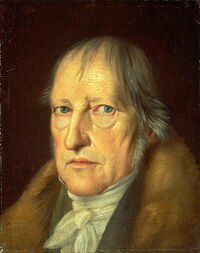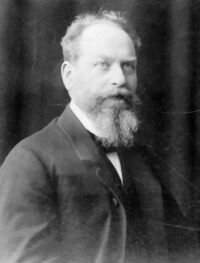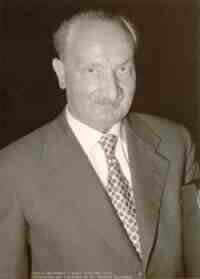Phenomenology has at least three main meanings in philosophical history: one in the writings of Georg Wilhelm Friedrich Hegel, another in the writings of Edmund Husserl in 1920, and a third, deriving from Husserl's work, in the writings of his former research assistant Martin Heidegger in 1927.
For G.W.F. Hegel, phenomenology is an approach to philosophy that begins with an exploration of phenomena (what presents itself to us in conscious experience) as a means to finally grasp the absolute, logical, ontological and metaphysical Spirit that is behind phenomena. This has been called a "dialectical phenomenology".
For Edmund Husserl, phenomenology is "the reflective study of the essence of consciousness as experienced from the first-person point of view." Phenomenology takes the intuitive experience of phenomena (what presents itself to us in phenomenological reflexion) as its starting point and tries to extract from it the essential features of experiences and the essence of what we experience. When generalized to the essential features of any possible experience, this has been called "transcendental phenomenology". Husserl's view was based on aspects of the work of Franz Brentano and was developed further by philosophers such as Maurice Merleau-Ponty, Max Scheler, Edith Stein, Dietrich von Hildebrand and emmanuel lévinas.
Martin Heidegger believed that Husserl's approach overlooked basic structural features of both the subject and object of experience (what he called their "being"), and expanded phenomenological enquiry to encompass our understanding and experience of Being itself, thus making phenomenology the method (in the first phase of his career at least) of the study of being: ontology.
The difference in approach between Husserl and Heidegger influenced the development of existential phenomenology and existentialism in France, as is seen in the work of Jean-Paul Sartre and Simone de Beauvoir. Munich phenomenologists (Johannes Daubert, Adolf Reinach, Alexander Pfänder in Germany and Alfred Schütz in Austria), and Paul Ricoeur have all been influenced. Readings of Husserl and Heidegger have also been crucial elements of the philosophies of Jacques Derrida and Bernard Stiegler.
Friday, April 03, 2009
Subscribe to:
Post Comments (Atom)
Blog Archive
-
▼
09
(334)
-
▼
April
(28)
- abortion
- Christian art
- Triple-alpha process
- timeline of Christianity
- Antioch
- Ministry of Jesus
- social action
- Abrahamic religion
- faith
- Presuppositional apologetics
- Shiloh
- Anthropic principle
- Authenticity
- Jonah
- Mesopotamia
- Dispensationalism
- Early Christianity
- Easter
- eternity
- Good Friday
- Plagues of Egypt
- Syriac Peshitta
- Passover
- abiogenesis
- William Lane Craig
- Phenomenology
- Augustine of Hippo
- Edmund Husserl
-
▼
April
(28)
LifeNews.com
Desiring God Blog
Youth for Christ International
related
- Follow Jesus
- Timothy Ministries News
- Dallas Willard
- Christian Resources
- Missional Church dot Org
- Between Two Worlds
- GinkWorld
- New Tribes Mission
- Prime Time Jesus
- All Things Aramaic
- Blogging the New Testament
- Campus Crusade for Christ International
- Bible.org
- Vineyard South Africa
- AnswersInGenesis
- Allelon Movement of Missional Churches
- Billy Graham
- Christian Classics Ethereal Library
- Christian answers
- Christian Worldview
- Historical Jesus Studies
- Monergism
- Christians Unite





No comments:
Post a Comment